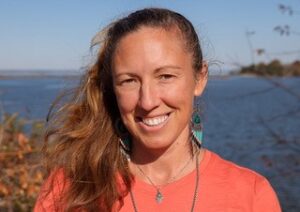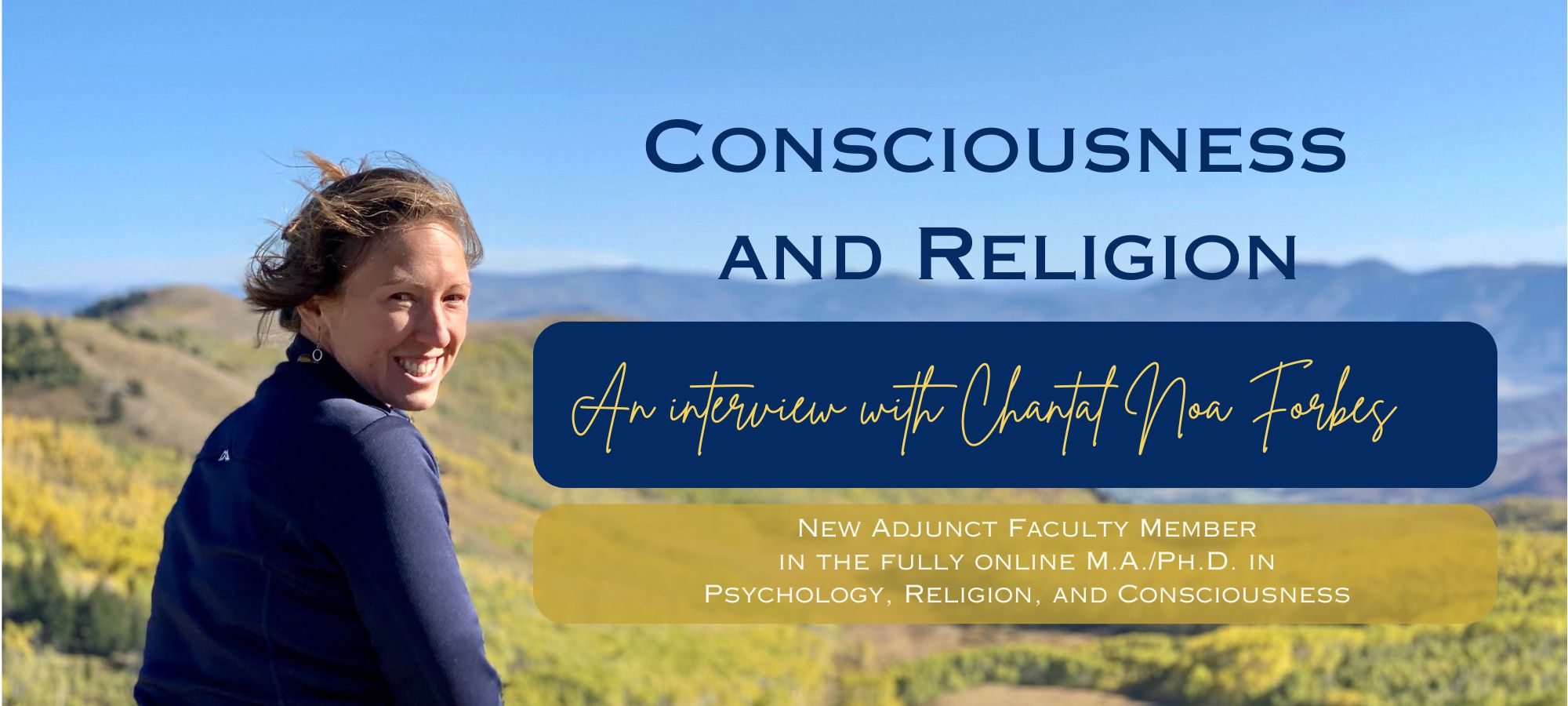Chantal Noa Forbes is a transdisciplinary scholar, storyteller, and educator at the intersection of ecology, spirituality, and culture, who will be joining the new fully online M.A./Ph.D. in Psychology, Religion, and Consciousness (PRC) in the Fall as an adjunct faculty member. I’m delighted to speak with Chantal about her work and upcoming participation in Pacifica’s new program.
Angela Borda: Thank you for your time in speaking with me today. Your biography reads like any journalist’s dream for an interview. There is so much we could dig into there. But first, to introduce you to the Pacifica community, can you speak about what it was like to grow up in South Africa and how that impacted your interest in indigenous and decolonial studies?
Chantal Noa Forbes: I have spent most of my life in South Africa. It was only when I enrolled in my Ph.D. in the Bay Area that I moved to the U.S. eight years ago. South Africa is a beautiful country with much ecological and cultural diversity. I was born in the 80s, which was a challenging time in South Africa. We were transitioning from a state of emergency as an Apartheid state toward a new and free democracy. My upbringing was marked by social protest and unrest and a desire to see a more just society where all communities, cultures, religions, and identities could be fairly represented in my country. It’s from that context that I became interested in decolonial studies in an attempt to understand how we decolonize our national narrative to allow for a more expanded history and narrative to emerge, and that also relates to my interest in Indigenous studies. Growing up in South Africa, we were mostly taught that First Nations peoples no longer existed in our country and their identities were labeled as “other” rather than being recognized as unique Indigenous communities. I wanted to know more about the specific history of Indigenous communities in the place where I was born.
Angela: The PRC program is one of two fully online Ph.D. programs that Pacifica is debuting, and part of the impetus for this is to open depth psychology to the whole world, to anyone with the passion to study the subject who has a working internet connection. But the online format will also allow faculty from all over the country and world to join together in this line of inquiry. What about the online nature of this program is most promising to you?
Chantal: It’s true that faculty from across the globe could contribute their unique knowledge and skills and provide different geographical and cultural perspectives. But that equally applies to the students. I was part of the initial admissions session for this program, and there were 10 or 15 people from across the continent present. Each had unique perspectives and motivations for wanting to engage in this learning and were in varying stages of their lives. An online program allows people at later stages of their life who have work or family commitments or are looking after their parents to engage in this process of inquiry without having to move states or continents to physically be in California.
Angela: What about the combination of religions and consciousness most sparks interest for you? What impact or benefit might this have on the students taking this path as their graduate study?
Chantal: That’s a great question. First, let me say that faculty members in this program come from a long intellectual lineage that considers religion and consciousness together. There are those like myself whose inquiry has emerged from the fields of religion and ecology and those whose inquiry has emerged from philosophy and consciousness. At the core of what is often promoted as two different disciplines, what religion and consciousness have in common as fields, is the question of humanity’s role or cosmic purpose on Earth. They have the question of consciousness itself in common: “What is consciousness?” and how does it relate to our spirituality or structured belief systems that we’ve cultivated throughout human history? In some ways, placing these two disciplines together allows for each to expand its horizons and move beyond its disciplinary boundaries. When we look at religion from the perspective of consciousness studies, we can ask what religion means in relationship to society’s understanding of consciousness in different eras; for example, contemporarily, how have contemporary understandings of consciousness influenced an increasing shift towards spirituality and new religious movements? And we can understand consciousness as expressed through the evolution of religion itself. So, placing these two disciplines in dialogue helps overcome insular, narrow perspectives of these social phenomena.
Angela: You came to your graduate studies and teaching career after spending many years working in documentary film, educational media, and communications across Africa, Southwest Asia, Southeast Asia, and Europe. Having seen and richly interacted with so much of the world, what did you find as commonalities and differences that might broaden or deepen what you contribute to the program’s study of religion, and consciousness?
Chantal: My work in this sphere began from a social perspective, being interested in the social interactions of different communities within particular geo-cultural contexts, and that somehow led me to working within the agricultural sector, where I noticed that agrarian communities, or groups of people with a long tradition of cultivating food, tend to value belief systems, either by being dedicated to spiritual practices or by being committed to the expression of religiously centered lives. The ways these communities make sense of their ecological worlds are more than merely scientific or based on biology. The way they make sense of their ecologies is also deeply intertwined with their belief systems and how they understand these to manifest in or through different forms of consciousness, whether human or non-human forms (visible or not) in day-to-day life. The deep desire in these communities to engage in spirituality or religion as it relates to their agrarian practices and the culture of how this influences how they produce and make food is what initially brought me to be interested in this work.
Angela: Can you tell us which courses you’ll be teaching?
Chantal: I’ll be teaching “Ecology, Religion, and Consciousness: Beyond Anthropocentrism” in the first year. And then, I’ll be teaching “Indigenous Psychologies and Cosmologies” in the second year of the program. There is a canon of work in ecology, religion, and consciousness from which to draw, which is meant to serve as a foundational grounding for students to understand in their first year. The curriculum for this Ph.D. is designed to help students become proficient in specific theories and concepts in a particular fashion. So, the first course I teach will introduce students to how ecology, religion, and consciousness intersect socially, culturally, and theoretically from a standpoint that decenters human supremacy, moving beyond outdated notions of the human as the center of the universe. That sets the platform for Year 2, which will include “Indigenous Psychologies and Cosmologies.” There, I’ll draw from cultures and scholars I am familiar with from Southern Africa, Australia, North America, and Canada, keeping in mind that when teaching about Indigenous psychologies and cosmologies, it’s crucial to uplift and bring to the forefront the teachings of Indigenous scholars and voices themselves. In that sense, it’s less about picking a culture or geography that may appeal to me or the students but working from a body of scholarship where Indigenous people have done the work so their voices can come forward.
Angela: One of the topics you work on caught my attention because I’m not familiar, and that would be “more-than-human personhood.” The phrase “more human than human” popped into my mind, in response, but I’m guessing you might not be referring to replicants in the movie Blade Runner! What is this line of inquiry, and will it be woven into your work at Pacifica?
Chantal: I’m using this term specifically from two different academic perspectives. One is the field of religion and ecology, where it’s common to refer to all sentient beings as “more than human.” The second is the perspective of anthropology, where the re-emergence of the concept of animism theoretically grounded a discussion of “other than” or “more than” human personhood in Indigenous lifeways from the 1990s onwards. For example, in Amazonian cosmologies, the role of the jaguar as a conscious being of personhood is varied and deeply ambiguous. It’s not only humans who have personhood, but animals, and in some cultures, rocks, rivers, and mountains all have agency and possess different degrees of personhood. So, it’s recognizing that personhood is not unique to humans but to all beings that have social relations with one another.
Angela: Do you have any upcoming publications or events or projects that you’d like to share with us?
Chantal: In the spring, I have a new course that I’ll be teaching outside of Pacifica titled “Rethinking Nature Conservation: An Interspecies Approach,” which I’m excited about. I also have two articles coming out in Spring and Fall, titled “Theorizing non-western ontologies towards a pedagogy of animist praxis.” And “Becoming Earth: Ontological-Fluidity, and the Practice of Tracking as a Transspecies Technology.”
Angela: Thank you so much for your time in speaking with me, and I’m excited to watch your teaching in the Psychology, Religion, and Consciousness unfold!
For more information about the new fully online M.A./Ph.D. in Psychology, Religion, and Consciousness (PRC), visit us here.

Chantal Noa Forbes, PhD, is a transdisciplinary scholar, storyteller, and educator at the intersection of ecology, spirituality, and culture. Her work explores the environmental significance of Indigenous and decolonial perspectives on multispecies ontology, more-than-human personhood, and cultural sovereignty. South African born and raised in an ethnically mixed family, Chantal identifies as a transnational scholar who forms part of the Global Majority (human and more-than-human). Chantal graduated with a Ph.D. in Philosophy and Religion from the California Institute of Integral Studies (CIIS). Before completing her Ph.D., Chantal spent twenty years working in social documentaries, environmental media, and agricultural communications across Africa, Southwest Asia, Southeast Asia, and Europe.

Angela Borda is a writer for Pacifica Graduate Institute, as well as the editor of the Santa Barbara Literary Journal. Her work has been published in Food & Home, Peregrine, Hurricanes & Swan Songs, Delirium Corridor, Still Arts Quarterly, Danse Macabre, and is forthcoming in The Tertiary Lodger and Running Wild Anthology of Stories, Vol. 5.


